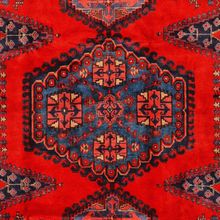Difference between revisions of "Viss Rug"
| Line 1: | Line 1: | ||
| − | + | {{Infobox Rug and Carpet | |
| + | |above = | ||
| + | |image = [[File:Viss-Rugs-Rugman-Collection.jpg|frameless|220px]] | ||
| − | + | |caption = Design of Viss Rug ([https://www.rugman.com/carpet-design/viss-rugs/ Rugman]) | |
| − | |||
| − | |||
| − | = | + | |image2 = |
| + | |caption2 = | ||
| − | + | <!--General information--> | |
| − | === | + | |Name = Viss Rug |
| + | |Original name = قالي آباده | ||
| + | |Alternative names = Viss Carpet | ||
| − | === | + | |Origin = {{flag|Iran}}: |
| + | |Category = City rug | ||
| + | |Prime examples = | ||
| + | |Master designers = | ||
| − | = | + | |To know more = |
| − | === | + | <!--Technical information--> |
| + | |Common designs = | ||
| + | |Common motifs & patterns = | ||
| + | |Common sizes = | ||
| + | |Common colors = | ||
| + | |Dyeing method = Natural dyes, synthetic dyes | ||
| + | |Pile material = | ||
| + | |Foundation material = | ||
| + | |Weaving Technique = | ||
| + | |Knot type = | ||
| + | |Knot density = | ||
| − | = | + | |additional info = |
| + | }} | ||
| + | Wiss rugs originate from Wiss, also referred to as Viss, a small town located near Hamadan. However, for a small town, Wiss has an eclectic mix of population. Kurds, Turks, and the nomadic people of Bakhtiari all call Wiss home, and it is the influence from these diverse groups that is an integral part of the weaving of wool rugs here. Due to its largely nomadic population, the majority of Wiss rugs feature geometric designs, which is an indication of a tribal rug. Its location so close to Hamadan has influenced the local weavers to create their wool rugs using the Hamadan weave, also referred to as the Sennah Baft. These wool rugs are woven with a Turkish symmetrical knot and a single shot of weft between the rows of knots.{{citation needed}} | ||
| − | + | <!-- from Rugman Archive:https://web.archive.org/web/20070613055700/http://www.rugman.com:80/Content/wiss.html | |
| − | + | #REDIRECT [[viss Rug]] | |
| − | + | --> | |
| − | |||
| − | |||
| − | |||
| − | |||
| − | |||
| − | </ | ||
| − | |||
| − | |||
| − | |||
| − | |||
| − | |||
| − | |||
| − | + | [[Category:Persian Rug and Carpet]] | |
| + | [[Category:Rug and Carpet]] | ||
| + | [[fa:قالي_ویست]] | ||
Revision as of 09:42, 26 August 2019
| Viss Rug | |
|---|---|
 Design of Viss Rug (Rugman) | |
| General information | |
| Name | Viss Rug |
| Original name | قالي آباده |
| Alternative name(s) | Viss Carpet |
| Origin | |
| Category | City rug |
| Technical information | |
| Dyeing method | Natural dyes, synthetic dyes |
Wiss rugs originate from Wiss, also referred to as Viss, a small town located near Hamadan. However, for a small town, Wiss has an eclectic mix of population. Kurds, Turks, and the nomadic people of Bakhtiari all call Wiss home, and it is the influence from these diverse groups that is an integral part of the weaving of wool rugs here. Due to its largely nomadic population, the majority of Wiss rugs feature geometric designs, which is an indication of a tribal rug. Its location so close to Hamadan has influenced the local weavers to create their wool rugs using the Hamadan weave, also referred to as the Sennah Baft. These wool rugs are woven with a Turkish symmetrical knot and a single shot of weft between the rows of knots.[citation needed]